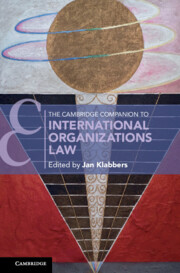Book contents
- The Cambridge Companion to International Organizations Law
- Cambridge Companions to Law
- The Cambridge Companion to International Organizations Law
- Copyright page
- Contents
- Contributors
- Acknowledgements
- Cases
- Introduction
- 1 Beyond Functionalism
- 2 The Concept of International Organization
- 3 Accountability
- 4 Inclusion and Exclusion in International Organizations
- 5 A Legal Framework on Internal Matters
- 6 Standard-Setting in UN System Organizations
- 7 Operational Activities
- 8 Deliberation
- 9 Teaching Statehood
- 10 Interaction between International Organizations
- 11 The International Organization for Migration and the Duty to Protect Migrants
- 12 Global Health
- 13 Energy Provision
- 14 International Organizations, Disarmament and State Behaviour
- 15 International Organizations and Stories of Development
- 16 Food Security and International Organizations
- 17 Financial Stability
- Epilogue
- Bibliography
- Index
2 - The Concept of International Organization
Published online by Cambridge University Press: 31 March 2022
- The Cambridge Companion to International Organizations Law
- Cambridge Companions to Law
- The Cambridge Companion to International Organizations Law
- Copyright page
- Contents
- Contributors
- Acknowledgements
- Cases
- Introduction
- 1 Beyond Functionalism
- 2 The Concept of International Organization
- 3 Accountability
- 4 Inclusion and Exclusion in International Organizations
- 5 A Legal Framework on Internal Matters
- 6 Standard-Setting in UN System Organizations
- 7 Operational Activities
- 8 Deliberation
- 9 Teaching Statehood
- 10 Interaction between International Organizations
- 11 The International Organization for Migration and the Duty to Protect Migrants
- 12 Global Health
- 13 Energy Provision
- 14 International Organizations, Disarmament and State Behaviour
- 15 International Organizations and Stories of Development
- 16 Food Security and International Organizations
- 17 Financial Stability
- Epilogue
- Bibliography
- Index
Summary
A fil rouge runs from the system of conferences, the river commissions and the administrative unions of the nineteenth century through the UN, its ‘family’ and the Bretton Woods institutions established in the mid-twentieth century, up to the most recent forms of international and transnational cooperation. The issues for which these forms of cooperation have been established range from the containment of communicable diseases to the protection of intellectual property, from the preservation of historic sites to food safety and from banking supervision to internet regulation. This phenomenon, as a whole, was analyzed as ‘the legal organisation of the international society’,1 or even ‘of the world’2 at the end of the nineteenth century. Activities and patterns have further developed into what is now called global governance.3 The entities engaged are intergovernmental organizations, treaty bodies, supervisory and expert bodies, standing secretariats, civil society actors, transnational corporations and varieties of hybrid or ‘soft’ actors, all of which have some ‘legal life’ of their own.
- Type
- Chapter
- Information
- Publisher: Cambridge University PressPrint publication year: 2022
- 3
- Cited by



